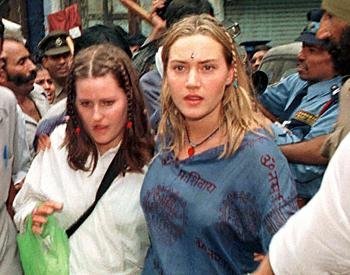![]()
![]()
![]()
by Massimo Introvigne

When "Holy Smoke" premiered as a movie at the Venice Film Festival in summer 1999, the Italian press praised it as a "balanced" approach to the brainwashing/deprogramming controversy. The Campion sisters now offer to us a book version (Holy Smoke: A Novel, New York: Hyperion, 1999), whose success will probably be chain-connected to the movie's. The novel is of considerable interest, however, for understanding the Campions' approach to deprogramming. The story is, in itself, fairly typical of classical "involuntary" deprogramming. Ruth, a young Australian seeker, travels to India and decides to stay with a guru, Chidaatma Baba (who has some features of Sathya Sai Baba). Alerted by a friend that Ruth is close to being initiated and enter into a "spiritual marriage" with the guru (whatever this may be), her mother contacts an Australian anti-cult psychotherapist, and through him a New York deprogrammer, P. J. Waters, introduced by his letterhead (interestingly enough) as an "exit counselor". Ruth's mother travels to India where she tries to psychologically blackmail her daughter to follow her home by claiming that Ruth's father is dying (he is not). When this does not work, an asthma attack of the mother and pressure from the Australian embassy persuade Ruth to board a flight to Australia. There, she is taken to a remote farm and clearly told that she is not free to leave (all the rhetoric on the differences between deprogramming and exit counseling notwithstanding).
Ruth's is not exactly a model family, including as it is an adulterous father, a pornography-obsessed brother and a flirtatious sister-in-law. Slowly, Ruth is introduced to the mature but not bad-looking deprogrammer, who starts with the usual routine of discussions and videos on brainwashing (a very simplified version of Lifton's Thought Reform) and its differences with legitimate persuasion processes such as the Marines'. "With the Moonies, the deprogrammer proclaims, four to five hours sleep, robotic schedule, out all hours selling trinkets on the streets, never alone, loved up on all sides: 'You're wonderful, dynamic, nice, good, smart.' Same could be said with armed forces with some crucial differences: there is no omnipotent leader, it's not a closed order, the mind control such as exists does not require recruits to mentally block against all other points of view. I know, I got organised in the Marines" (p. 123). Ruth doesn't buy this obvious crap (does the reader?), although she is more impressed by photographs of a young girl allegedly raped by her guru and by the deprogrammer's private story of how his own gay guru once sexually molested him. She conceives a dangerous plan of seducing the deprogrammer and proving him a hypocritical "salivating old slob".
The book alternates chapters where Ruth and the deprogrammer P.J. tells each her or his version of the story, and at this point the reader understands that in fact they are both sexually involved, as much as they may intellectually dislike each other. Things develop as they should, and the reader is invited to a feast of sexual activities more usually associated with a well-known White House intern than with deprogramming. This deprogramming for voyeurs is not the whole story, however. Both lovers feel guilty: Ruth does not manage to hate the deprogrammer as she thinks she should, and P.J. (apart the ethical thing, not very high here as in real-life deprogrammers' scale) has a fiancée in New York (another girl she deprogrammed) he is about to marry. In the end, violence erupts, P.J. hurts Ruth, the family reacts, and the whole deprogramming business collapses. Ruth goes back to India to shop for gurus more reputable than Chidaatma, this time conveniently chaperoned by her mother, and P.J. marries his fiancée in New York. Ruth, however, writes to P.J. that, although she has found a boyfriend, she still "loves him [P.J.] from afar".
Waiting for the movie (where Kate Winslet will play Ruth and the conveniently dark Harvey Keitel will be P.J.), one may note, firstly, that this is not a black-and-white novel playing a deluded cultist against the hero deprogrammer. Both characters have their dark sides, and the deprogrammer is no less ready for the sexual exploitation of a younger girl than the guru, with his sinister-looking proposal of "spiritual marriage", allegedly was. The novel is much more about wild passion and a complicate psychosexual interplay between a mature man and a younger girl than about new religious movements. Some trivial stereotypes about cults and brainwashing go, however, unchallenged, and the final bibliography is not reassuring. Apart from the obligatory Lifton, the Campions quote Steve Hassan, journalistic works ranging from the reasonable (Shaw's Spying in Guru Land) to the extremely anti-cult (Shaw's Killer Cults ), and even Tal Brooke's Lord of the Air, an Evangelical expose of Sathya Sai Baba as the Antichrist. There are three references to Eastern spirituality (Irina Tweedie, Yogananda, and the Bhagavad Gita) and Larry Shinn's book on the Hare Krishna is also included. Although, as the press reported during the Venice Film Festival, the Campions claimed to have consulted also with scholars opposed to deprogramming, they are not quoted in the bibliography.
Certainly the novel does not glorify deprogramming per se, and parents exposed to the book or the movie may even be scared out of hiring expensive sexual predators with letterhead introducing them as "exit counselors". On the other hand, Harvey Keitel fans may go to the movie and fall prey of the same Stockholm syndrome apparently affecting Ruth in the story. They may end up regarding deprogrammers engaged in kidnapping and imprisonment as romantic criminals while, outside of the novels and the movie theaters, romance and criminality are rarely associated.
Back to the CESNUR Page on Brainwashing and Mind Control Controversies
![]()
[Home Page] [Cos'è il CESNUR] [Biblioteca del CESNUR] [Testi e documenti] [Libri] [Convegni]
[Home Page] [About CESNUR] [CESNUR Library] [Texts & Documents] [Books] [Press Releases] [Conferences]
![]()